Janome Ruffler Foot for Acufeed Models. 846 415 008
Janome Domestic Accessories > Acufeed Ruffler Attachments
Rufflers have been around for a very long time and have changed very little over the years. They have however remained very popular. Althought at first sight, a ruffler may appear bulky and complicated, but its innovative design actually makes it very easy to use. This design allows fabrics to be ruffled or pleated to the desired fullness quickly and easily and also has the capability to vary the size of ruffles.

Variant:
Acufeed Sewing Machines
Suitable Machines:
Tips For Using the Janome Ultimate Ruffler
Even if you've never used the a ruffler foot before, don't be intimidated. Follow these simple steps to make a professional looking ruffle.
Parts of the Ruffler
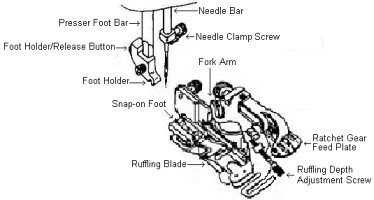
Attaching Ruffler to the Machine
- Thread the machine with polyester thread in needle and bobbin. Cotton thread has a tendency to break easily.
- Remove the current pressure foot by pressing the Foot Holder/Release Button.
- Raise the Needle Bar to the highest position.
- Position the Fork Arm (black curved piece) over the Needle Clamp Screw. Lower the Presser Foot bar and snap in place.
Needle Placement
- Lower the needle slowly to make sure that the needle clears the Needle Hole.
- If the needle does not clear the Needle Hole, loosen the Needle Hole Position screw to adjust the needle hole position. There are two Needle Hole Positioning screws. Refer to the diagram to move the position hole to the correct location.

- The Ruffler is now adapted to your sewing machine. This process only needs to be done once.
Part Functions
-
Ratchet Gear Feed Plate or Stitch Control

This is the part of the Ruffler with the numbers 1, 6 and 12. These settings will determine how often the Ruffling Blade (saw tooth edge) will gather or tuck. When set at 1, with each needle penetration the Ruffling Blade will move creating a tiny gather. When set at 6, the Ruffling Blade will move and create a tuck every 6 stitches. When set at 12, the Ruffling Blade will move and create a tuck every 12 stitches. When set at the Star, no tucks will be sewn but a straight stitch is obtained. -
Ruffling Depth Adjust Screw
The Ratchet Gear Feed Plate and Ruffler Depth Adjust Screw work hand-in-hand to create exactly the type of gathers or tucks desired. The Ruffler Depth Adjust Screw determines the depth of the tuck. When the screw is set at 1 the Ratchet Gear will take a tiny bite of the fabric. The higher the number the larger the bite. If tiny gathers are desired, set the Ratchet Gear at 1 and the Depth Adjust screw between 1 and 4.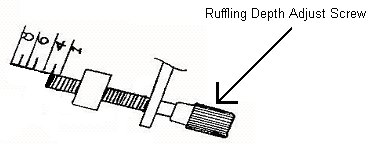
-
Stitch Length
Another important element to achieving beautiful ruffles is how long the stitch length is set on the sewing machine. The shorter the stitch length the tighter the ruffles. A stitch length of 5.0 is suggested when the Ratchet Gear Feed Plate is set at 1 and the Ruffling Depth Adjust Screw is at a higher number. -
Sewing
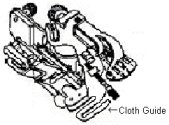 Place the fabric underneath the Ruffling Blade and above the Cloth Guide Plate. As you sew, the Ruffling Blade will move, creating a tuck, according to the adjustments made to the Gear Plate and Ruffling Depth. For best result, sew slowly.
Place the fabric underneath the Ruffling Blade and above the Cloth Guide Plate. As you sew, the Ruffling Blade will move, creating a tuck, according to the adjustments made to the Gear Plate and Ruffling Depth. For best result, sew slowly.
Cloth Guides
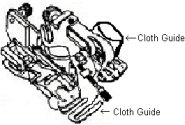
- There are two different Cloth Guides on the Ruffler. One located in the front of the Ruffler and the second located on the right side. When the fabric is place in the Cloth Guide in the front a 1/4" seam allowance is sewn. When placed in the Cloth Guide on the right, a 1" seam allowance is sewn.
Ribbon Slot
- The Ribbon Slot is located directly in front of the Needle Hole. This slot can be used to guide the ribbon or piping which can be sewn on while making a ruffle. The ribbon will not gather but the fabric it is sewn to will gather.
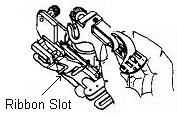
Ruffling Techniques
The length of fabric needed to be cut would be determined by the amount of ruffling desired. It is best to always sew a test strip to determine length of fabric required. 1. Cut a strip of cotton fabric at least 18". For a test strip cut the width at least 2".
- For a gathered effect set the Ratchet Gear Plate on 1. Set the Ruffling Depth Screw to 1 or less.
- Set the stitch length on 2 - 2.5. Place the fabric under the Ruffling Blade and sew. 18" of fabric should gather down to approximately 9".
- Cut another strip of cotton fabric at least 18" x 2". Set the Ratchet Gear Plate on 6 and the Ruffling Depth Screw on 4. Stitch length 2.2. Place the fabric under the Ruffling Blade and sew. The fabric strip gathered down to approximately 12".
- Test sew several lengths of fabric to see exactly what happened each time the Ratchet Gear Plate, Ruffling Depth Screw and stitch length settings are changed.
- MaKe a notebook, writing down the setting used for your samples for future reference.
- Once the ruffle is made, attach to the project with a straight stitch, right sides together.
If the Thread Breaks during Ruffling
- Place the ruffle back under the Ruffling Blade as close to the thread break as possible. Pull on the fabric. A little pleat will be formed in the ruffle behind the Ruffler.
- Finish the ruffling. Remove the Ruffler. Snap on the Zig Zag foot A or Satin Stitch foot F. Straight stitch down the pleat that was formed where the thread broke.
Sewing a Ruffle to a Straight Piece of Fabric
- Set the Ratchet Gear Feed Plate and Ruffling Depth Adjustment Screw at desired setting.
- Place the straight piece of fabric under the Ruffler attachment, next to the feed dogs, right side up.
- Place the fabric to be ruffled under the Ruffling Blade, right side up, against the front Cloth Guide.
- Match the raw edge of the straight fabric and the fabric to be ruffled.
- Sew slowly. The top fabric will ruffle as the bottom fabric stays straight.
Ruffle around a Corner for a Pillow
- Place the fabric to be ruffled wrong side up under the Ruffling Blade, against the front Cloth Guide.
- Place the middle of one side of the Pillow top right side up under the Ruffler attachment next to the feed dogs.
- Set the stitch length to 5.0.
- Sew until approximately 1" from the corner. Stop with the needle in the down position. Turn both the base fabric and ruffle fabric slightly as you sew around the corner, gently moving the fabrics as you sew.
- Continue sewing to the next corner and repeat step 4.
Note: If more fullness at the corners is desired, shorten the stitch length on the machine and return to 5.0 stitch length when sewing straight.
Pleating or Gathering Lace or Ribbon
- Lace and ribbon that is 1" or wider can be pleated or gathered.
- Sometimes the teeth will get caught in the lace as the Ruffling Blade comes back to make another pleat. To eliminate this, cut 1" wide strips of wash away stabilizer to lay over the lace. Sew the stabilizer to the lace before you begin ruffling.
Adjusting the Ruffler for Pleating
- Move the Ratchet Gear feed Plate to either 6 or 12.
- Set the Ruffling Depth Adjust Screw to 8 for the deepest pleats.
- Set Stitch Length on the machine between 1 and 2.
- Insert fabric to be pleated under the Ruffling Blade. Sew slowly adjusting the stitch length on the machine as you sew. You will notice a significant change in the size of the pleats.
Ruffling Two Pieces of Fabric together at Once
- Baste the two pieces together with a straight stitch. If this step is omitted the pieces are often pulled apart as the Ruffling Blade picks up the top layer and the ruffle looks twisted.
- Ruffle as if you were sewing one piece of fabric.
Puffing Strips
Adding a Puffing Strip or Strips is usually a technique used in Heirloom Sewing. The Strip gives a garment or project softness and dimension. Batiste is usually the fabric of choice for Puffing Strips. Cut the fabric from selvage to selvage 1/2" wider and 1 1/2 - 2 1/2 times longer than the desired finished Puffing Strip. If necessary, sew strips together to achieve the desired length. By gathering both long sides of the fabric, the Ruffler will make nice puffing with the puffing being evenly distributed.
- Set the Ratchet Gear at 1 and the Ruffling Depth Adjust Screw at 6. Set the Stitch Length on the machine at 3.0.
- Ruffle down both sides of the fabric strip.
- The Puffing Strip is now ready to be inserted into your project.
Fabrics that are traditionally difficult to gather, such as velvet and fleece, behave incredulously using the Ruffler. Ruffled gathers are more flattering than traditional gathers as they are perfectly uniform and the Ruffler is a great time saver. If you take time to learn the Ruffler you will wonder how you ever gathered without this wonderful accessory for your sewing machine.



